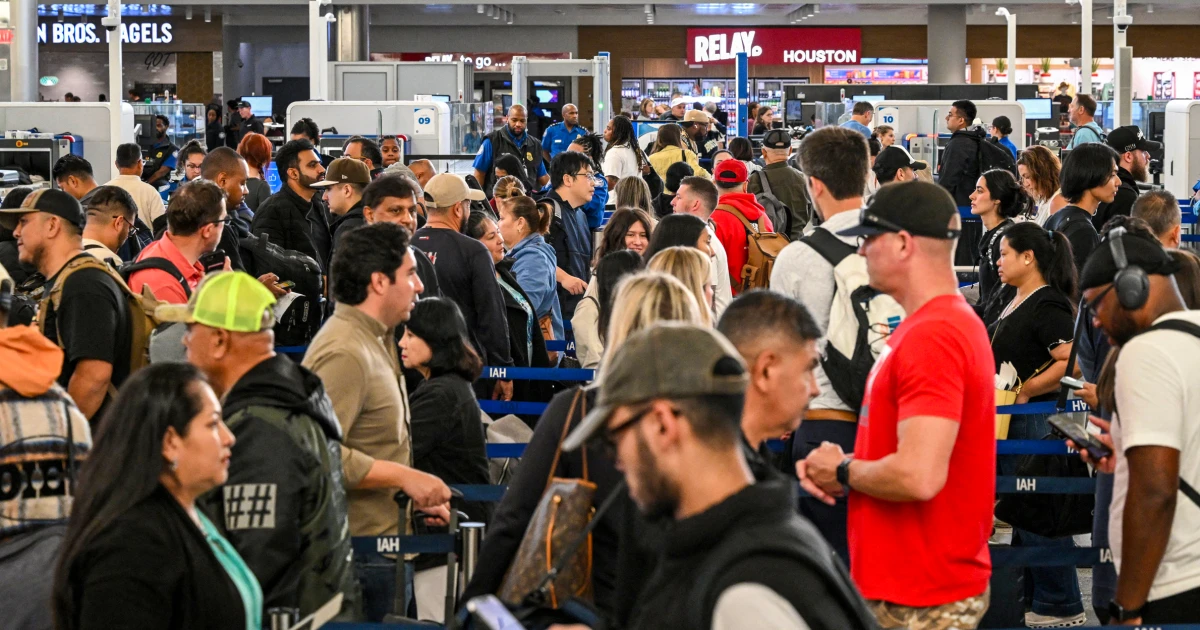Copyright NBC News

More than 1,000 flights were called off nationwide Friday — five times the number canceled Thursday, according to FlightAware, a website that tracks flight disruptions. Reagan National Airport was hit the hardest with at least 18% of its arrivals — 81 flights — canceled Friday. The major hubs of O’Hare, Atlanta, Denver and Dallas-Fort Worth rounded out the top five airports for cancellations, but those airports only lost around 3% of their flights. Not all the cancellations were due to the FAA order, and both United and American airlines said they were able to quickly rebook most travelers. The airlines focused their cuts on smaller regional routes to airports where they have multiple flights a day, helping minimize the number of passengers impacted. Delta Air Lines said it scratched roughly 170 flights Friday while American planned to cut 220 each day through Monday. Southwest Airlines cut about 120 flights Friday. The FAA said the reductions impacting all commercial airlines are starting at 4% of flights at the busiest airports and will ramp up to 10% over the coming week. “I just don’t want to be stranded at the airport sleeping on a bench,” Michele Cuthbert, of Columbus, Ohio, said about an upcoming flight to Dallas. “Everyone’s paying the price for the politics that’s going on. We’re just collateral damage.” If the shutdown continues, there may be another knock-on effect ahead of the holidays. Nearly half of all U.S. air freight is shipped in the bellies of passenger aircraft, so the disruption could raise costs for shipping goods, said Patrick Penfield, professor of supply chain practice at Syracuse University. “Air travel is part of the infrastructure backbone of the American economy,” said Greg Raiff, CEO of the Elevate Aviation Group consultancy. “This shutdown is going to impact everything from cargo aircraft to people getting to business meetings to tourists being able to travel.” Flying anywhere for the Thanksgiving holiday is likely to be tortuous for legions of travelers — even if the government shutdown ends today, Transportation Secretary Sean Duffy warned today. Hundreds of flights during one of the busiest travel weeks of the year could be affected by staffing shortages of air traffic controllers. The shortages have been exacerbated by the shutdown, prompting the Federal Aviation Administration to implement unprecedented flight reductions. And those staff shortages — at least for now — appear to be set in stone for Thanksgiving, Duffy said. “So if the government opens on Day 1, will I see an immediate response from controllers? No, the union is telling me it’s going to take time to get them all back in,” Duffy told CNN today when asked if the flight reductions would spill into the holiday. Read the full story here The partial government shutdown is the longest shutdown in U.S. history, with air traffic controllers among those employees working without pay. The record as the nation’s longest was broken Wednesday, on the 36th day of the shutdown that began on Oct. 1. Before that, the longest government shutdown was a 35-day shutdown from Dec. 22, 2018, until Jan. 25, 2019. That stemmed from a fight over funding for President Donald Trump’s border wall. This shutdown is over health insurance subsidies on the Affordable Care Act market, which without action will expire at the end of the year and raise costs for consumers. Senate Democrats want the subsidies and talks on other issues, and Republicans have refused to extend the subsidies as part of continuing to fund the government and are calling for a “clean” resolution.



